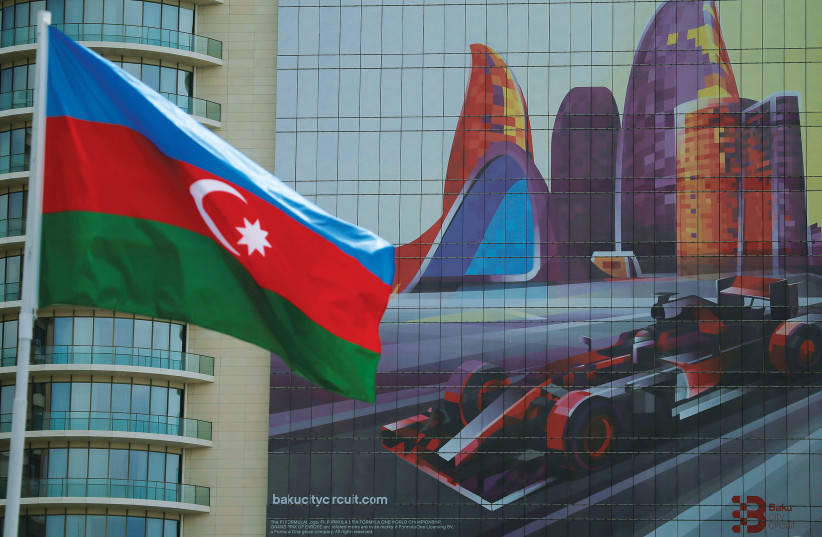In the early hours of September 13, heavy artillery shelling by Azerbaijan struck five different targeted locations inside Armenian territory. It was a major incursion with significant loss of life and one that signals a calamitous road ahead for the South Caucasus. It also raised the stakes for regional and global powers – Israel crucial among them – to play a role in stepping up to stabilize the situation.
The last major war between Armenia and Azerbaijan, which lasted 44 days in the fall of 2020, established clear military superiority on the part of Baku, enabled by vast oil and gas wealth as well as superior weapons technology purchased from Israel and Turkey. Through that conflict, Azerbaijan effectively wrested back control of the breakaway Nagorno-Karabakh region, a majority Armenian enclave that had been granted to Azerbaijan during the Soviet period.
After the fall of the Soviet Union, the Armenians of Nagorno-Karabakh had built a self-proclaimed republic, with an elected parliament, free press and robust civil society. Since the 2020 war, those residents face what is to them an unpalatable future of being integrated into Azerbaijan.
Azerbaijan presses for greater gains from Armenia
As many victors would, Azerbaijan is now using its military advantage to press for greater gains, far beyond what international mediators – traditionally the US, EU and Russia – would have ever accepted or allowed. This has resulted in a press into Armenian territory that significantly endangers Armenia’s future capacity for self-defense. The trend is toward increased turbulence, continued bloodletting and more elusive peace in this region.

Allies of Turkey and Azerbaijan, such as Israel, may see no problem with such consequences for Armenia. But this degree of imbalance and kinetic erosion of the status quo is in no one’s interest, not Israel’s and not even Azerbaijan’s. Land grabs will not solve Baku’s long-term challenges or mollify its needs for domestic reforms.
Its long-term stability depends on much wiser actions than the ones we’ve seen in the past 24 hours and much wiser rhetoric than the hate speech consistently hurled toward Armenians. Those might rally a crowd, but they won’t make Azerbaijan the stable, consistent partner for security that many of its allies want to see.
How is Israel involved in the Armenia-Azerbaijan conflict?
In the near term, Israel’s role in exacerbating the power imbalance hasn’t gone unnoticed. No one begrudges Israel for its relationships and alliances in an insecure region. But a deep friendship with Azerbaijan should not make Israel an enabler of a stark, ongoing blitz against the Armenian state. This summer the newly appointed Israeli Ambassador to Armenia and Moldova, Joel Lion, made his inaugural visit to Yerevan, touting the prospect of small steps toward better Armenian-Israeli relations.
The most poignant conversation was around development cooperation, helping Armenia build on its efforts toward sustainable growth. But it goes without saying that Armenians won’t appreciate the help with irrigation technology when they are at risk of total annihilation. Already, journalists and civil society actors (ourselves included) need to get their phones regularly checked for Israeli Pegasus software, apparently deployed by Baku.
It is not bold to say that Azerbaijan’s policy priorities toward Armenia center on destruction – from massive incursions like the one last night to cultural erasure that has bordered on maniacal. In the most brazen moment, Azeri authorities in the region of Nakhichevan bulldozed over one of the world’s largest arrays of Armenian khachkars, or cross-stones, precious works of medieval art that dotted the landscape.
High-resolution satellite imagery from the American Association for the Advancement of Science (AASS) found that the sacred treasures, which marked a centuries-old cemetery, were destroyed by heavy machinery. Even Turkey, Azerbaijan’s closest ally and widely recognized as the perpetrator of the 1915 Armenian Genocide, had never been quite so brazen about cultural destruction.
IN A REGION that is moving backward, with tendencies to purge populations, large-scale border incursions cannot be seen only as such. They are a turn toward the worst instincts and darkest outcomes. Israel should want the peace and stability that Armenians, among others, profoundly crave. Azerbaijan, outside of its current populist urges, would benefit from the same. Armenia and Azerbaijan were in clear and very public peace talks before last night’s fighting derailed the process. Real restraint by Baku is the order of the day.
Azerbaijan is clearly the regional economic powerhouse from a resources perspective, and its strategic geography gives it many hands to play in the development of Eurasian transit routes. Taking over parts of Armenia, as its President Ilham Aliyev has rhetorically proclaimed, is a goal too far and in no one’s long-term interests.
The US, EU, Russia and even Iran have tried their turn at mediating between Armenia and Azerbaijan. Israel should realize the havoc that is happening and play a real, constructive role between the two countries. It should stop short of giving Azerbaijan the most lethal offensive weapons technology, which is clearly becoming a driver toward more extreme military action. Israel can use its leverage with Baku to pave a middle path between realpolitik and its values, becoming a stabilizing player in the South Caucasus.
Leonid Nersisyan is a defense analyst and research fellow at APRI Armenia. He is a co-author of the books Waiting for the Storm: The South Caucasus as well as Storm at Caucasus. Lara Setrakian is an Armenia-American journalist, digital strategist and entrepreneur. She is the CEO and executive editor of News Deeply and the founder of APRI, a new think tank in Yerevan.
